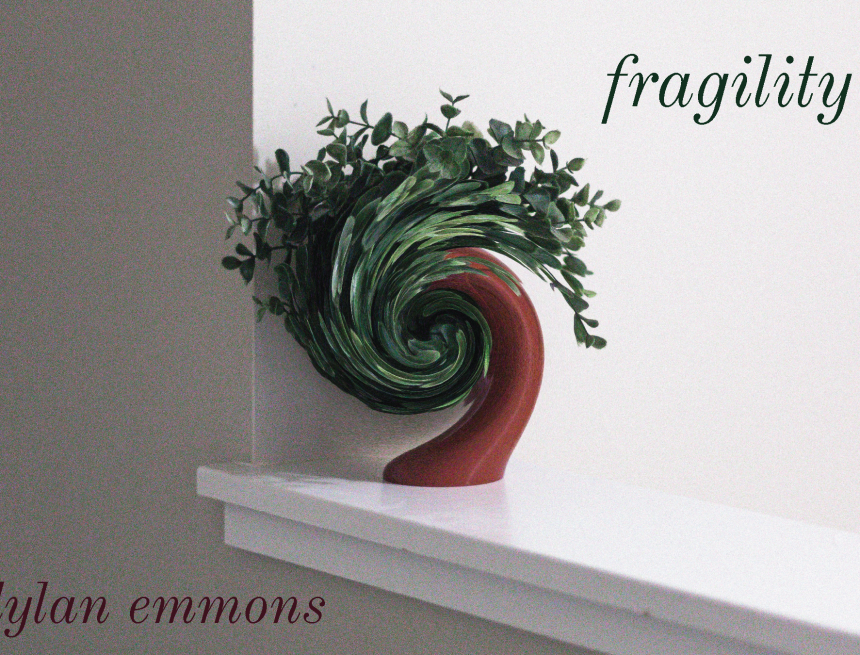The moment I almost lost it, I was in a friend’s kitchen, one in the morning. The soupy light left rings at the upper rim of the walls. The mood remained distant and squirrelish. As Nate stood watching, I feverishly plucked napkins from the stack peeking out of a ceramic dish and, one at a time, re-stacked them on the table. A crucifix on the wall to my left competed for my attention.
“Dude . . . do you realize what you’re doing?”
“Hold on.”
He watched me as if I were enacting some B-reel footage from a low- budget asylum thriller. I could tell he was worried about the combined effects of my autism and the acid on my executive function and powers of behavioral regulation. So was I. But I was unable to simultaneously complete my task and explain myself.
My logic, twisted and depleted by a second round of the acid, was that if I could separate the stack into individual napkins, if they didn’t accordion cartoonishly in my grip, if they didn’t leech consciousness from my fingertips and start wriggling around with mal-intent as had my bootlaces only minutes before, then I could safely call myself out of the woods. If not, maybe I really was marooned on this island of experience where objects didn’t stay put, and I waited to be blasted by storms of fate and consequence. Nate’s glasses refracted light unnaturally and his eyes narrowed and darkened in concern or judgment.
“Seriously, what are you doing, man?”
One napkin tried to unfurl itself from my grip on its way to the new stack. But a single napkin, it remained. I smiled.
“I had to do that. For my sake. My state—I can’t explain.”
A rest settled over the room as Nate pondered. He shifted all of his weight, and as his shadow pushed candlelight all over the deep brown walls, it was easy to forget it was the floor creaking, and not the shadows, not the napkins, or the bones in my neck. I re-shuffled my napkins, my sweet, merciful, individual napkins.
“I’m okay. I think I’m gonna be.”
Nate retreated upstairs to attend to his own private hell, which manifested as a confounding trip to the bathroom. When he told me later, I felt for him. The only time I had dealt with anything similar on acid, I had already come down.
Presently, I sat at the table under the direct glare of the cross and closed my eyes. My condition released me the same, blissful way a charley horse abates itself. No longer would I be trapped in this universe where my sight was on a full second-long delay. I wouldn’t need to waste attention trying to figure out why my pocket didn’t want to give up my cell phone, or wondering if I would ever drive again or hold a real job, or worrying that somehow because of my autism, my psychedelic nightmare would alter me in some irreversible, heretofore unseen way. I wouldn’t have to be studied after all—the autistic man almost out of grad school and on the threshold of honest responsibility, now sitting in the corner, forever, yelling at his shoelaces. I breathed it all out of me like a black wind.
My eyes snapped open. I was back.
I swore off acid after that. The thought (a common paranoia) that I was in danger of retaining permanent damage had gone, but so had my desire to try and gain experiential wisdom from LSD. Mine was a mild “bad trip”—and it’s that same fact, along with its accompanying specter of all the worse ones lying in the wait in alternative dimensions of thought like Lovecraftian demons, that keeps me away. I’ve known people, both autistic and neuronormative, who have fared worse. For instance, a friend of mine once ate four grams of mushrooms, forgot who she was, and lost herself for a considerable time in my two-floor dorm building. Another friend, also shrooming, came to the horrifying, solipsistic conclusion that everyone he’d ever met, his mind had dreamt up for its own purposes. My own near-undoing turned out to be just a regular part of the dance with this drug (similar to a physical vacation): the escape, the adventure, the reflection, the dread of, and then uninvited longing for, the return home. I am, happily, just a wimp of a psychedelic adventurer, an autistic man who prefers familiar psychological landscapes.
Nate didn’t get off so easily. He couldn’t sleep for thirty-six hours afterward, and called me, frantic, after he saw the sidewalk moving on the way to turn in job applications. He says he still gets “acid dots”—the walls, the air, life, veiled by technicolor snowstorm. Possibly, it’s Hallucinogen Persisting Perception Disorder type 2. Possibly, it’s related to pre-existing autoimmune and mental- health conditions. Maybe the tabs really had been “double drops,” as whoever had sold them to Nate had suggested. But they always say that. Maybe the acid night would contribute to the nervous breakdown Nate would experience months later. What I do know without a doubt about my experience is that I was peering over the edge of a mighty chasm that night. Anyone who’s been there, however temporarily, knows the feeling. That’s where it is, you think to yourself. That place really exists, waiting to be fallen into.
Dylan Emmons is an author, educator, and consultant living in the Hudson Valley. His work has appeared in Gargoyle, Wordgathering, Better than Starbucks, Autism Parenting Magazine, and elsewhere. His memoir, Living in Two Worlds: On Being a Social Chameleon with Asperger’s, was released in 2016.

